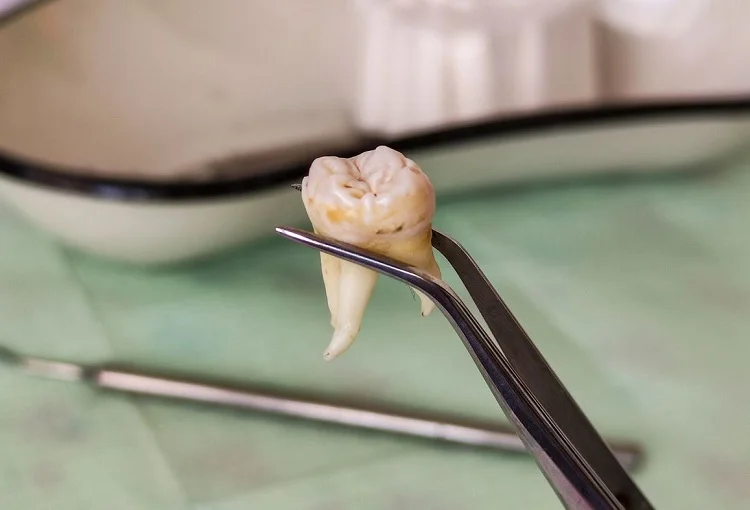Last Updated on: 27th December 2025, 06:14 am
What to eat after wisdom tooth extraction becomes crucial for a successful recovery following any surgical procedure, particularly when dealing with the back of the mouth. Even though eating might pose discomfort after the removal of wisdom teeth, it remains vital to identify suitable foods that can provide the body with the essential nutrients required for the healing process.
Wisdom Tooth Extraction
Wisdom teeth erupt between the ages of 17 and 21, although in some people this may happen later. They are the last teeth to appear in the mouth and often do not find space to settle, so they must be extracted frequently.
Most of the time, when wisdom teeth have already erupted in the mouth, it is possible to remove them without surgery. However, it is common for them to be submerged in the maxillary bones, either totally or partially. In these cases, a small surgical intervention is usually required, where the gum is lifted, part of the surrounding bone tissue is removed or the molar is sectioned.
The necessity of removing wisdom teeth varies. While some people may need to have their wisdom teeth extracted due to issues like dental crowding or impaction, others can keep them without any problems. Dentists evaluate each person’s situation through examinations and X-rays to determine whether removal is necessary. Consulting a dental professional is crucial in making an informed decision about whether or not to remove wisdom teeth. For further information on whether wisdom teeth need to be removed, you can refer to the comprehensive guide that provides a thorough discussion of this subject.
What to Eat After Wisdom Tooth Extraction?
During the first day, cold and soft foods will be your best allies, as they will help control inflammation and avoid harming the area. Some options are:
• Jelly
• Fruit smoothies
• Mashed potatoes
• Fruit puree (seedless)
• Water-based ice cream
• Pudding
• Soups and broths (consumed warm, not hot)
From the second day, it is suggested to consume a diet rich in protein and vegetables, preferably soft. Some options are:
1. Eggs
2. Tuna
3. Skim milk
4. Fish
5. Pasta
6. Cooked cereals such as oatmeal or cream of rice.
7. Skinless chicken
8. Ground meat
9. puree vegetables such as broccoli or cauliflower.
10. Spinach
11. Carrot puree or juice
12. Avocado
13. Tofu
14. Hummus
15. Bananas
16. Yogurt
17. Pancakes with jelly
Staying hydrated is also essential for good healing, so try to drink at least two liters of water a day. If the inflammation is so severe that it prevents you from eating properly, you can buy over-the-counter food supplements.
There are times that food stuck in a wisdom tooth hole post-extraction can be uncomfortable. The limited space makes it hard to remove particles through regular brushing and flossing. Rinsing gently with warm water and using a syringe, as advised by a dentist, helps dislodge trapped food and prevent complications for proper healing. To find guidance on removing food stuck in a wisdom tooth hole, you can consult this article.
What Foods Should you Avoid After Wisdom Teeth Extraction?
→Do not eat hot food: Avoid soups and hot drinks, as these could increase inflammation. Try to wait for food to cool down before eating it.
During the first 5 days:
→ Avoid foods that may irritate the area:
• Spicy: Chile peppers.
• Acids: Lemon, oranges, grapefruit.
• Sugary: Gummies, caramels, marshmallows.
• Fatty and fried
→Do not consume drinks with a straw or those carbonated: Since the suction forces and bubbles can dislodge the clot that forms in the wound. The clot is essential for healing; if it does not remain in place, new bone and gums do not form in the space where the tooth was, delaying healing. This condition is known as dry socket, and it is very painful.
→ Do not smoke: Nicotine decreases blood flow in the mouth and prevents healing. This makes recovery take longer. Don’t chew tobacco either, as this has the same effect.
During the first week:
→Do not consume hard or brittle foods that can get stuck in the space where the wisdom tooth was. If this happens, a severe infection can result. Try to avoid:
• Hard or crunchy foods: toast, popcorn, pizza
• Seeds and nuts
• Alcohol
• Grains: Quinoa & Rice
It is recommended to perform a gentle washing of the affected area with a syringe and saline solution to remove any residual food debris that may remain inside the wound and avoid complications.
How Long Does it Take to Recover From Wisdom Teeth Extraction Surgery?
Recovery time after a wisdom tooth extraction will vary depending on the complexity and length of the procedure. Sometimes, the wisdom teeth are in difficult positions, and their extraction may require lifting the gum or mucosa, removing a small portion of bone, or sectioning the molar. In these cases, recovery usually takes longer.
Under normal conditions, after a week the inflammation will have decreased significantly. After 15 days, the alveolus, that is, the space where the wisdom tooth was located, will be healed. However, it will not be until 4 months that new bone forms and complete healing is achieved.
In certain instances, the socket from a wisdom tooth extraction fails to fully close, creating an enduring memory of the dental intervention. Over time, this unfilled space persists as a palpable link to the extraction process, despite the surrounding tissues having undergone healing. This unrepaired void stands as a distinctive testament to the intricate nature of oral well-being and the body’s capacity to recover. Routine dental examinations play a pivotal role in overseeing the state of the unclosed wisdom tooth socket, safeguarding against potential future issues.
Some actions you can take include irrigating the socket of a wisdom tooth is a gentle and important practice in oral care. After wisdom tooth extraction, a socket can sometimes harbor food particles and debris, leading to discomfort and potential infection. Using a specialized syringe or irrigation device, a gentle stream of water or saline solution can be directed into the socket to flush out any remnants. This helps maintain cleanliness, promote healing, and reduce the risk of complications. However, it’s crucial to follow dentist-recommended guidelines for irrigating the socket to avoid excessive force that could disrupt the healing process. Consulting a dental professional for proper technique and frequency is advisable to ensure optimal post-extraction care.
Frequently Asked Questions
What is the usual timeframe for returning to a regular diet after wisdom tooth removal?
In the majority of cases, patients can resume their normal routines and diets within the initial seven days after having their wisdom teeth extracted.
What are recommended foods to consume following wisdom teeth removal?
Following the extraction of wisdom teeth, it’s advised to stay hydrated with water and opt for easily tolerated soft foods like yogurt and applesauce. It’s best to avoid alcohol, hot beverages, and carbonated drinks during the recovery period as they could potentially irritate the tooth sockets.
Why is it recommended to avoid dairy consumption after a tooth extraction?
Furthermore, dairy products are tougher for the body to digest due to the presence of casein protein. This protein significantly slows down the digestion process and raises inflammation in the body. Its effects can potentially hinder the healing process and lead to increased discomfort.
Is it safe to consume spaghetti three days post wisdom teeth removal?
You might consider enjoying a serving of soft-cooked pasta after having your wisdom teeth removed. While pasta can be a suitable option, ensure it’s cooked to a very soft texture, avoiding any al dente consistency. Additionally, it’s advisable to steer clear of tomato-based sauces due to their acidity, which could potentially cause discomfort at the extraction site.
Share:
References
1.Crichton-Stuart, C., & Ames, H. (Mar 24, 2018). 16 soft foods to eat after wisdom teeth removal. Retrieved from: Medicalnewstoday.com. https://www.medicalnewstoday.com/articles/321300
2. Oral surgery. (2021). Cleveland Clinic. Retrieved from: https://my.clevelandclinic.org/health/treatments/22085-oral-surgery
3. Nutrition to help heal wounds after surgery. (s/f). Memorial Sloan Kettering Cancer Center. Retrieved from: https://www.mskcc.org/es/cancer-care/patient-education/nutrition-help-heal-your-wounds-after-surgery
4.Sandoval, Y. (Jul 20, 2023). Tooth Extraction: Complete Guide to a Quick Recovery. Dentaly.org. Retrieved from: https://www.dentaly.org/es/odontologia-general/extraccion-dental/
5.INhitlock, J. (Dec 28, 2008). What to eat after surgery and what to avoid. Verywell Health. Retrieved from: https://www.verywellhealth.com/what-to-eat-during-your-recovery-after-surgery-3156923
-
Nayibe Cubillos M. [Author]
Pharmaceutical Chemestry |Pharmaceutical Process Management | Pharmaceutical Care | Pharmaceutical Services Audit | Pharmaceutical Services Process Consulting | Content Project Manager | SEO Knowledge | Content Writer | Leadership | Scrum Master
View all posts
A healthcare writer with a solid background in pharmaceutical chemistry and a thorough understanding of Colombian regulatory processes and comprehensive sector management, she has significant experience coordinating and leading multidisciplina...




















